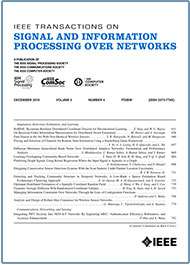- Our Story
- Publications & Resources
- Publications & Resources
- Publications
- IEEE Signal Processing Magazine
- IEEE Journal of Selected Topics in Signal Processing
- IEEE Signal Processing Letters
- IEEE Transactions on Computational Imaging
- IEEE Transactions on Image Processing
- IEEE Transactions on Information Forensics and Security
- IEEE Transactions on Multimedia
- IEEE Transactions on Signal and Information Processing over Networks
- IEEE Transactions on Signal Processing
- IEEE TCI
- IEEE TSIPN
- Data & Challenges
- Submit Manuscript
- Guidelines
- Information for Authors
- Special Issue Deadlines
- Overview Articles
- Top Accessed Articles
- SPS Newsletter
- SigPort
- SPS Resource Center
- Publications FAQ
- Blog
- News
- Dataset Papers
- Conferences & Events
- Community & Involvement
- Professional Development
- For Volunteers
- Information for Authors-OJSP
-
Home
Conferences Events IEEE Signal Processing Magazine IEEE SPL Article IEEE TIFS Article IEEE TMM Article IEEE TSP Article Jobs in Signal Processing Lectures Machine Learning Seasonal Schools Signal Processing News SPM Article SPS Distinguished Lectures SPS Newsletter Article SPS Webinar SPS Webinars SPS Webinar Series Webinar webinars
-
Our Story
What is Signal Processing?

The technology we use, and even rely on, in our everyday lives –computers, radios, video, cell phones – is enabled by signal processing. Learn More » -
Publications & Resources
-
SPS Resources
- Signal Processing Magazine The premier publication of the society.
- SPS Newsletter Monthly updates in Signal Processing
- SPS Resource Center Online library of tutorials, lectures, and presentations.
- SigPort Online repository for reports, papers, and more.
- SPS Feed The latest news, events, and more from the world of Signal Processing.
-
SPS Resources
-
Conferences & Events
-
Community & Involvement
-
Membership
- Join SPS The IEEE Signal Processing Magazine, Conference, Discounts, Awards, Collaborations, and more!
- Chapter Locator Find your local chapter and connect with fellow industry professionals, academics and students
- Women in Signal Processing Networking and engagement opportunities for women across signal processing disciplines
- Students Scholarships, conference discounts, travel grants, SP Cup, VIP Cup, 5-MICC
- Young Professionals Career development opportunities, networking
- Get Involved
-
Technical Committees
- Applied Signal Processing Systems
- Audio and Acoustic Signal Processing
- Bio Imaging and Signal Processing
- Computational Imaging
- Image Video and Multidimensional Signal Processing
- Information Forensics and Security
- Machine Learning for Signal Processing
- Multimedia Signal Processing
- Sensor Array and Multichannel
- Signal Processing for Communication and Networking
- Signal Processing Theory and Methods
- Speech and Language Processing
- Technical Working Groups
- More TC Resources
-
Membership
-
Professional Development
-
Professional Development
- Signal Processing Mentorship Academy (SigMA) Program
- Micro Mentoring Experience Program (MiME)
- Distinguished Lecturer Program
- Distinguished Lecturers
- Distinguished Lecturer Nominations
- Past Lecturers
- Distinguished Industry Speaker Program
- Distinguished Industry Speakers
- Distinguished Industry Speaker Nominations
- Industry Resources
- IEEE Training Materials
- Jobs in Signal Processing: IEEE Job Site
-
Career Resources
- SPS Education Program Educational content in signal processing and related fields.
- Distinguished Lecturer Program Chapters have access to educators and authors in the fields of Signal Processing
- Job Opportunities Signal Processing and Technical Committee specific job opportunities
- Job Submission Form Employers may submit opportunities in the area of Signal Processing.
-
Professional Development
-
For Volunteers
-
For Board & Committee Members
- Board Agenda/Minutes* Agendas, minutes and supporting documentation for Board and Committee Members
- SPS Directory* Directory of volunteers, society and division directory for Board and Committee Members.
- Membership Development Reports* Insight into the Society’s month-over-month and year-over-year growths and declines for Board and Committee Members
-
For Board & Committee Members
Popular Pages
Today's:
- SPS Webinar: Bilinear Expectation Propagation for Distributed Semi-Blind Joint Channel Estimation and Data Detection in Cell-Free Massive MIMO
- Information for Authors
- MLSP TC Home
- Access Restricted
- IEEE Transactions on Information Forensics and Security
- SPS Webinar: Signal Processing for Expressive Neural Networks: Toward Lightweight Intelligence
- IEEE Signal Processing Letters
- (ASRU 2025) 2025 IEEE Automatic Speech Recognition and Understanding Workshop
- (ICME 2026) 2026 IEEE International Conference on Multimedia and Expo
- IEEE Transactions on Audio, Speech and Language Processing
- (ICASSP 2026) 2026 IEEE International Conference on Acoustics, Speech, and Signal Processing
- Membership
- Submit Your Papers for ICASSP 2026!
- IEEE Transactions on Signal Processing
- Conference Call for Papers
All time:
- Information for Authors
- Submit a Manuscript
- IEEE Transactions on Image Processing
- IEEE Transactions on Information Forensics and Security
- IEEE Transactions on Multimedia
- IEEE Transactions on Audio, Speech and Language Processing
- IEEE Signal Processing Letters
- IEEE Transactions on Signal Processing
- Conferences & Events
- IEEE Journal of Selected Topics in Signal Processing
- Information for Authors-SPL
- Conference Call for Papers
- Signal Processing 101
- IEEE Signal Processing Magazine
- Guidelines
Last viewed:
- Information for Authors
- Access Restricted
- Conference Call for Papers
- Self-Supervised Representation Learning: Introduction, advances, and challenges
- SPS Webinar: Bilinear Expectation Propagation for Distributed Semi-Blind Joint Channel Estimation and Data Detection in Cell-Free Massive MIMO
- Call for Mentors: 2025 IEEE SPS SigMA Program - Signal Processing Mentorship Academy
- (ICIP 2025) 2025 IEEE International Conference on Image Processing
- IEEE Transactions on Signal Processing
- (MMSP 2025) 2025 IEEE 26th International Workshop on Multimedia Signal Processing
- (ASRU 2025) 2025 IEEE Automatic Speech Recognition and Understanding Workshop
- Governance Documents
- IEEE Transactions on Information Forensics and Security
- Submit a Manuscript
- MLSP TC Home
- A New Image Compression Algorithm Based on Non-Uniform Partition and U-System
Resilient Distributed Diffusion in Networks With Adversaries
You are here
Publications & Resources
Transactions on Signal and Information Processing over Networks
For Authors
Top Reasons to Join SPS Today!
1. IEEE Signal Processing Magazine
2. Signal Processing Digital Library*
3. Inside Signal Processing Newsletter
4. SPS Resource Center
5. Career advancement & recognition
6. Discounts on conferences and publications
7. Professional networking
8. Communities for students, young professionals, and women
9. Volunteer opportunities
10. Coming soon! PDH/CEU credits
Click here to learn more.
Resilient Distributed Diffusion in Networks With Adversaries
In this article, we study resilient distributed diffusion for multi-task estimation in the presence of adversaries where networked agents must estimate distinct but correlated states of interest by processing streaming data. We show that in general diffusion strategies are not resilient to malicious agents that do not adhere to the diffusion-based information processing rules. In particular, by exploiting the adaptive weights used for diffusing information, we develop time-dependent attack models that drive normal agents to converge to states selected by the attacker. We show that an attacker that has complete knowledge of the system can always drive its targeted agents to its desired estimates. Moreover, an attacker that does not have complete knowledge of the system including streaming data of targeted agents or the parameters they use in diffusion algorithms, can still be successful in deploying an attack by approximating the needed information. The attack models can be used for both stationary and non-stationary state estimation. In addition, we present and analyze a resilient distributed diffusion algorithm that is resilient to any data falsification attack in which the number of compromised agents in the local neighborhood of a normal agent is bounded. The proposed algorithm guarantees that all normal agents converge to their true target states if appropriate parameters are selected. We also analyze trade-off between the resilience of distributed diffusion and its performance in terms of steady-state mean-square-deviation (MSD) from the correct estimates. Finally, we evaluate the proposed attack models and resilient distributed diffusion algorithm using stationary and non-stationary multi-target localization.
SPS Social Media
- IEEE SPS Facebook Page https://www.facebook.com/ieeeSPS
- IEEE SPS X Page https://x.com/IEEEsps
- IEEE SPS Instagram Page https://www.instagram.com/ieeesps/?hl=en
- IEEE SPS LinkedIn Page https://www.linkedin.com/company/ieeesps/
- IEEE SPS YouTube Channel https://www.youtube.com/ieeeSPS
Home | Sitemap | Contact | Accessibility | Nondiscrimination Policy | IEEE Ethics Reporting | IEEE Privacy Policy | Terms | Feedback
© Copyright 2025 IEEE - All rights reserved. Use of this website signifies your agreement to the IEEE Terms and Conditions.
A public charity, IEEE is the world's largest technical professional organization dedicated to advancing technology for the benefit of humanity.











